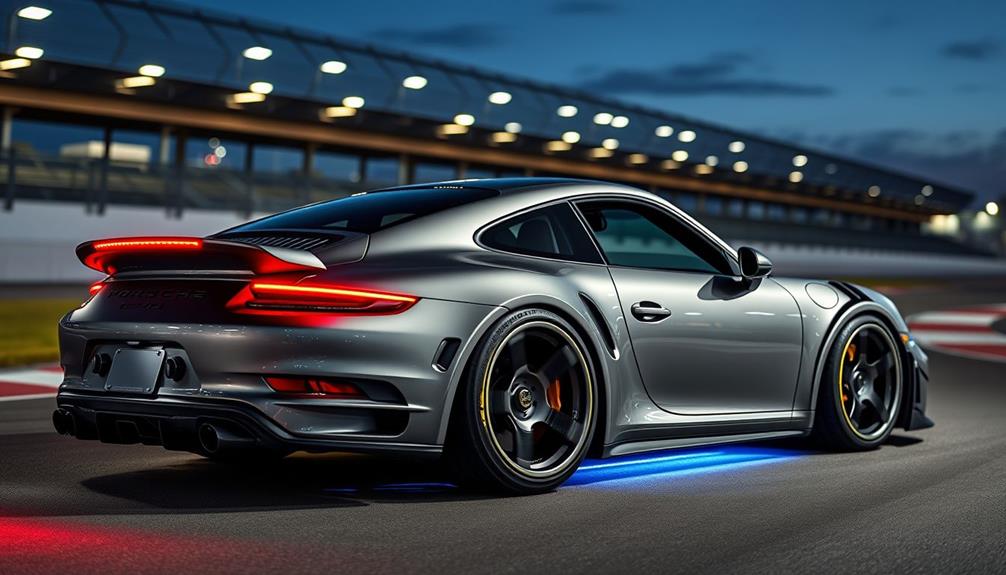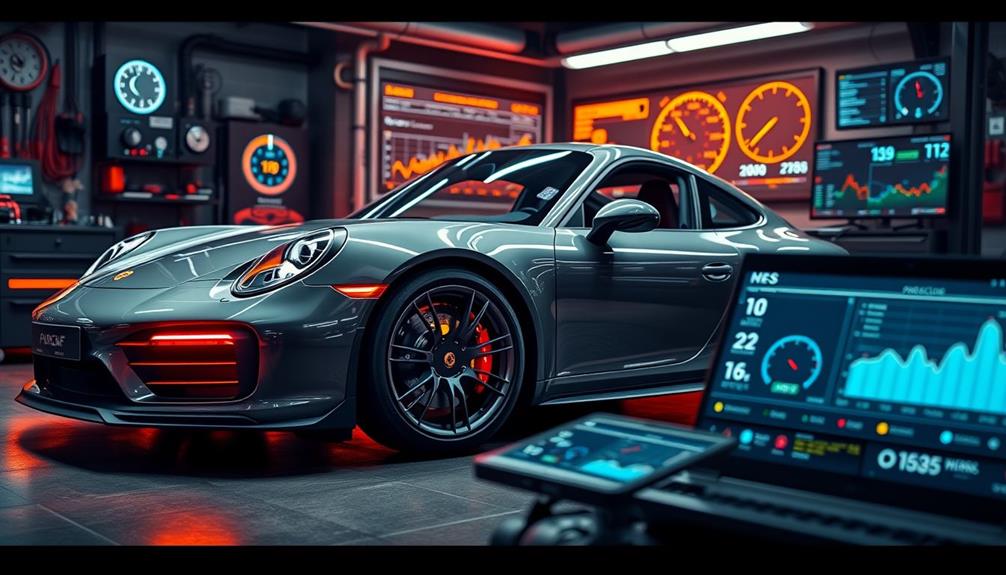Tuning your Porsche 930 enhances both its power and style, transforming it into a legendary supercar. You can start by upgrading the camshaft and installing performance headers to boost horsepower and throttle response. A quality boost controller lets you dial in precise boost levels, maximizing power output. Don't forget about weight reduction; removing excess weight can greatly improve acceleration and handling. Custom exhaust systems elevate the exhaust note while revealing more horsepower. Engaging with the vibrant community of enthusiasts can provide valuable insights and support as you take your tuning project to the next level.
Key Takeaways
- Upgrade the camshaft and headers to significantly enhance horsepower and throttle response for improved performance.
- Implement a boost controller to finely tune boost levels, potentially achieving up to 456 rear wheel horsepower.
- Focus on weight reduction strategies, such as replacing seats and removing sound deadening, to enhance agility and lap times.
- Optimize fuel management systems to ensure a balanced air/fuel ratio, preventing lean running and potential engine damage.
- Engage with online forums for valuable insights, DIY guides, and community support on tuning modifications for your Porsche 930.
Porsche 930 Overview
The Porsche 930, produced between 1975 and 1989, stands out as a landmark in automotive history. As the first turbocharged production car by Porsche, the Porsche 930 Turbo redefined performance and speed, earning the title of the fastest production car of its time.
You'll appreciate the power from its 3.0L flat-six engine, initially producing 260 hp. In 1978, Porsche enhanced this beast with a 3.3L engine featuring air-to-air intercooling, boosting output to an impressive 296 hp.
Its distinctive wide body, flared fenders, and iconic "whale tail" spoiler not only lend an aggressive appearance but also enhance aerodynamic performance. You can't overlook the suspension setup, which shares components with the standard 911. The front struts with torsion bars and standalone rear shock absorbers allow you to customize handling characteristics through aftermarket upgrades.
This model's legacy is undeniable, firmly cementing its place in automotive history. The Porsche 930 Turbo is a sought-after classic among car enthusiasts and collectors, celebrated for its unique blend of performance and styling.
Owning one means you hold a piece of that remarkable legacy in your hands.
Current Performance Setup
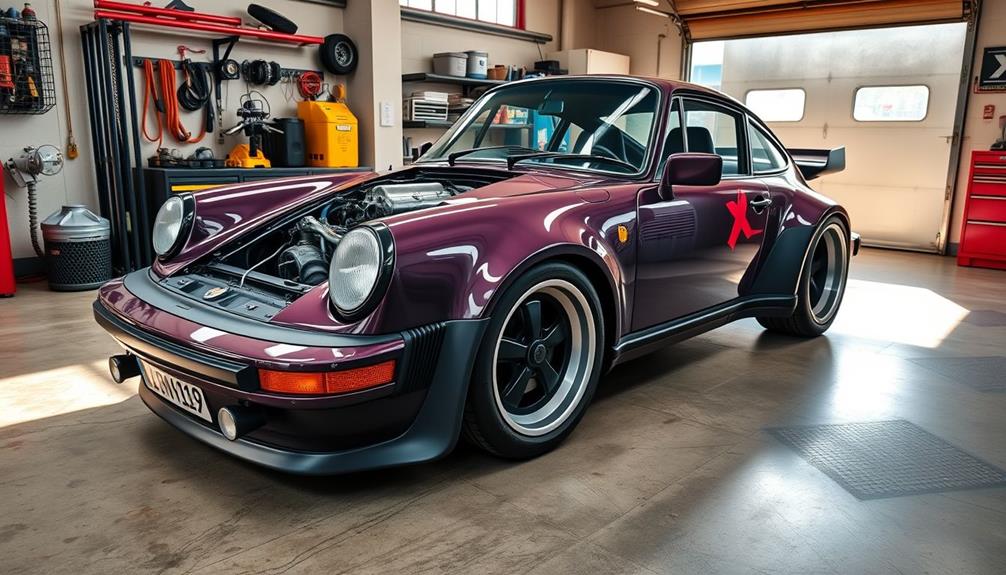
Upgrading your Porsche 930's performance can markedly enhance your driving experience. The 1988 model you're working with features an upgraded intercooler, a K-27 turbo, and a Borla quad exhaust, generating an impressive 307 horsepower at the rear wheels. This setup already provides a thrilling ride, but there's room for improvement.
You can focus on key performance enhancement areas like upgrading camshafts. Installing SC or 964 camshafts will considerably boost your engine's efficiency without a complete rebuild.
Additionally, consider adding headers to reduce turbo lag, allowing for quicker spool times and a more responsive throttle.
Another crucial aspect is the integration of a boost controller. This device enables you to manage power delivery effectively, ensuring you maximize the benefits of your turbo setup.
Moreover, tweaking the gearing—like opting for a 5-speed transmission or lower gearing—can enhance acceleration and overall driving dynamics.
Lastly, don't overlook weight reduction strategies. By removing unnecessary components, you can improve your Porsche's power-to-weight ratio, making every drive feel even more exhilarating.
With these current performance setups, you're well on your way to a more thrilling driving experience.
Suggested Performance Upgrades
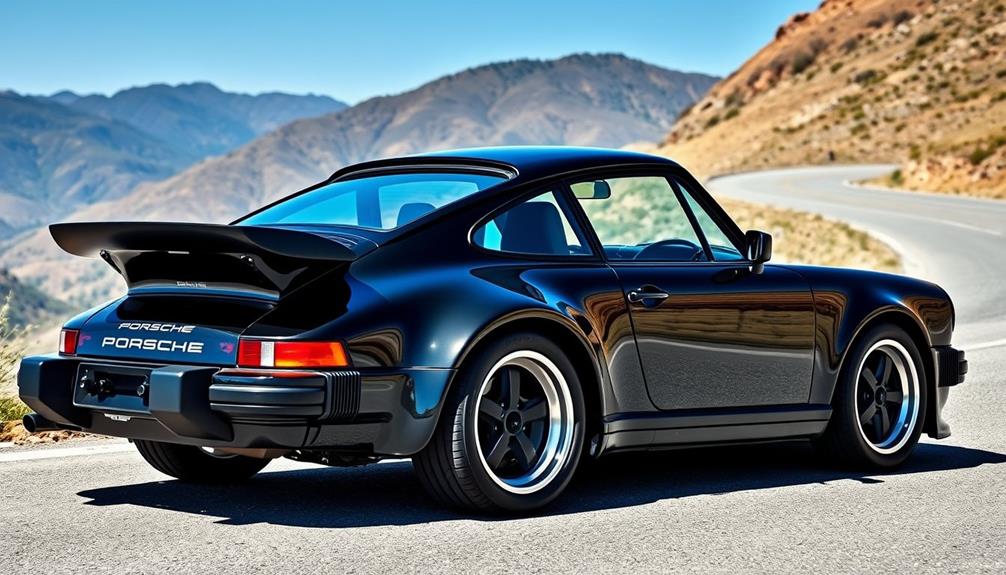
If you're looking to release your Porsche 930's true potential, consider upgrading the camshafts for a noticeable boost in horsepower and responsiveness.
Adding aftermarket headers can reduce turbo lag and further enhance performance, while a boost controller optimizes your power delivery for quicker acceleration.
These upgrades can transform your driving experience, making it even more exhilarating.
Camshaft Upgrade Benefits
When considering performance enhancements for your Porsche 930, camshaft upgrades stand out as a powerful option. Upgrading to SC or 964 camshafts can greatly enhance your car's power band, improving throttle response and overall horsepower output.
You'll notice a broader power curve with the SC camshaft, leading to smoother and more powerful acceleration compared to stock camshafts.
One of the main camshaft upgrade benefits is the optimization of air-fuel delivery, allowing for more efficient combustion. This can translate to an increase of 20-30 additional rear wheel horsepower in certain setups.
While you won't typically need an engine rebuild for a camshaft upgrade, you might've to adjust your fuel management systems to guarantee everything runs smoothly and prevents running lean.
Keep in mind that installing upgraded camshafts may also require additional modifications, like better headers and exhaust systems, to fully release the better performance you're aiming for.
Header Performance Enhancement
One of the most effective ways to boost your Porsche 930's performance is by installing high-quality performance headers. These headers are designed to enhance exhaust flow, greatly reducing turbo lag and increasing horsepower. You could see gains of up to 30-50 horsepower depending on your specific setup and modifications.
When choosing headers, consider lightweight materials like stainless steel. They not only improve performance but also help reduce overall weight, enhancing your vehicle's handling dynamics. However, keep in mind that proper tuning is essential after installation. It guarantees ideal air/fuel ratios, maximizing your performance gains while preventing potential engine damage from running lean.
Here's a quick comparison of header options:
| Header Type | Material | Estimated Horsepower Gain |
|---|---|---|
| Stock | Steel | 0 HP |
| Aftermarket Mild | Mild Steel | 20 HP |
| Aftermarket High | Stainless Steel | 30-50 HP |
Pairing these header upgrades with a boost controller and other enhancements can yield even better results in both horsepower and overall driving experience. Enjoy the thrilling performance your Porsche 930 can achieve!
Boost Controller Advantages
Installing a boost controller is a smart move to maximize your Porsche 930's performance after upgrading your headers. This essential component helps maintain wastegate closure until maximum boost is reached, effectively reducing turbo lag and enhancing overall power delivery.
With a boost controller, you can make precise adjustments to boost levels, allowing for ideal performance tuning without risking engine damage from excessive pressure. Users often report significant performance gains, with horsepower reaching up to 456 rwhp when properly tuned and paired with upgraded components.
Fine-tuning the boost controller's duty cycle can optimize your setup, enabling adjustments in the range of 10-12% to achieve your desired power outputs. This level of control makes it easier to tailor your car's performance to your specific driving style.
Moreover, implementing a boost controller is a cost-effective upgrade that can yield substantial performance gains, especially when combined with other enhancements like upgraded turbochargers and intercoolers.
Fuel Management Strategies

When tuning your Porsche 930 Turbo, proper fuel management is essential to avoid running lean and risking engine damage.
You'll want to optimize your fuel delivery system for balanced performance, ensuring the right amount of fuel reaches each cylinder.
Additionally, managing excess fuel is important; without fuel enrichment, you could face issues like oil washing off cylinder walls and fouling spark plugs.
Importance of Fuel Enrichment
Fuel enrichment plays an essential role in tuning the Porsche 930, guaranteeing the engine runs smoothly and efficiently. It helps prevent the engine from running lean, which can lead to excessive heat and detonation, causing significant damage.
The stock CIS (Continuous Injection System) on your 930 can support up to 450hp, but maintaining the ideal air/fuel mixture is vital for performance.
If you run too rich, you might experience oil washing off the cylinder walls, fouled spark plugs, and reduced overall performance, highlighting the importance of careful tuning.
Implementing an engine management system can greatly enhance fuel enrichment, allowing for precise fuel delivery that maximizes power while safeguarding engine integrity.
Regularly monitoring and adjusting the air/fuel mixture becomes critical, especially when making performance upgrades. This balance guarantees you maintain both power output and engine safety.
Remember, the goal is to achieve the right fuel enrichment level to release your Porsche 930's full potential while preventing potential issues.
With the right approach, you can enjoy a thrilling driving experience without compromising the longevity of your classic supercar.
Optimizing Fuel Delivery Systems
Achieving ideal performance in your Porsche 930 requires a keen focus on fuel delivery systems. The factory's Continuous Injection System (CIS) can support up to 450hp, but proper management of air/fuel ratios is essential to avoid running lean and risking engine damage.
Upgrading to a modern engine management system can help optimize fuel delivery across all cylinders, enhancing power while maintaining reliability.
Consider the following strategies:
- Implement a boost controller to keep the wastegate closed until maximum boost is achieved.
- Regularly conduct dyno testing to validate your fuel management strategies.
- Guarantee accurate fuel dispersion through precise tuning.
- Monitor air/fuel ratios closely to prevent excessive fuel, which can lead to reliability issues.
- Maintain an eye on spark plug condition to avoid fouling.
Managing Excess Fuel Risks
While tuning your Porsche 930 for peak performance, managing excess fuel risks is essential to prevent engine damage. Proper fuel management guarantees you don't run lean, which can lead to catastrophic failures.
The CIS system can support up to 450hp, but careful tuning is necessary to maintain that power without sacrificing reliability.
Excess fuel in the combustion chamber can wash oil off the cylinder walls, increasing wear and fouling spark plugs. This makes precise fuel enrichment critical for peak operation.
Consider upgrading to an engine management system to enhance fuel delivery across all cylinders, guaranteeing a balanced air/fuel mixture that boosts performance.
Monitoring fuel dispersion is fundamental. Leaner settings during tuning can lead to dangerous detonation, while overly rich mixtures can cause carbon buildup and lower efficiency.
Regularly evaluating your air-fuel ratio with gauges helps maintain peak performance and prevents issues related to excess fuel, especially during spirited driving or track use.
Exhaust System Enhancements

Upgrading the exhaust system on your Porsche 930 can greatly enhance performance and driving experience. By replacing the stock thermal reactors with euro or aftermarket exhaust systems, you can typically add 15-20 horsepower. High-performance headers are another great option, reducing turbo lag and improving exhaust flow for increased responsiveness.
Consider the following enhancements to get the most out of your exhaust system:
- Euro-style mufflers: They enhance the exhaust note while providing extra power.
- High-performance headers: These can notably boost horsepower and reduce lag.
- Open element air filters: While they offer modest gains, maintaining their integrity is key for engine protection.
- Custom piping: Optimize diameter and bends to improve flow and reduce back pressure.
- Compliance checks: Verify your modifications align with local emissions regulations.
These exhaust system enhancements not only elevate your Porsche's performance but also provide a more thrilling driving experience.
Just remember to align your choices with your overall performance goals to achieve the best results.
Impact of Weight Reduction
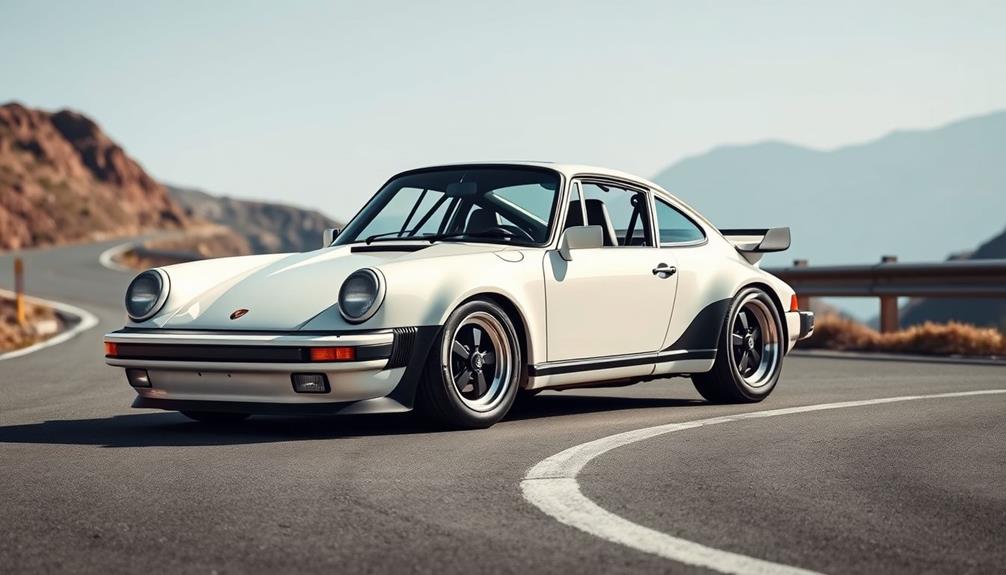
Reducing your Porsche 930's weight can dramatically improve its acceleration, handling, and overall performance. Estimates suggest that every 100 pounds you remove can shave about 1-2 seconds off your lap times. Implementing effective weight reduction strategies not only enhances your car's power-to-weight ratio but also makes it feel more agile on the road and track.
Here's a quick glance at some weight reduction strategies:
| Strategy | Weight Savings |
|---|---|
| Replace stock seats with racing seats | 30-50 pounds |
| Remove sound deadening materials | 10-20 pounds |
| Use lightweight carbon fiber body panels | Varies (up to 50 pounds) |
| Install lightweight wheels | 10-20 pounds per corner |
Community Insights and Experiences

As you immerse yourself in the world of Porsche 930 tuning, you’ll quickly discover a vibrant community of enthusiasts enthusiastic to share their insights and experiences. Whether you’re interested in classic 930 models or modern tuning options for Porsche 718, you’ll find a wealth of knowledge and resources within the community. From engine upgrades to suspension enhancements, there are endless possibilities for customizing and optimizing your Porsche for performance. Engaging with fellow enthusiasts can also provide valuable advice and guidance as you navigate the world of Porsche tuning.
Forums like Rennlist and Pelican Parts are treasure troves of information where owners discuss their tuning modifications and the resulting performance enhancements.
You'll find that many emphasize the importance of balanced upgrades, such as pairing intercooler enhancements with exhaust modifications, to maximize horsepower without jeopardizing engine health.
Here are some key insights from the community:
- Owners report achieving impressive results, with one claiming 456 rwhp using a K27-7200 turbo.
- DIY guides and troubleshooting tips empower you to tackle your tuning projects with confidence.
- Members frequently share their personal vehicle projects, revealing diverse interpretations of performance enhancements.
- Discussions often highlight the significance of maintaining a balanced approach to modifications.
- The collective passion for the Porsche 930 shines through every conversation and shared experience.
Engaging with this community not only enriches your knowledge but also inspires you to take your Porsche 930 to new heights.
Legal Considerations for Modifications

When considering modifications for your Porsche 930, it's vital to navigate the legal landscape that comes with these enhancements. First, keep in mind that any modifications can impact your warranty. It's important to understand how changes affect manufacturer coverage and to communicate with your insurer about any performance parts you're installing.
Adhering to local emissions standards is another significant consideration. Some modifications, like aftermarket exhaust systems, may require compliance to avoid legal penalties.
Upgrading to performance parts can greatly boost horsepower and torque, but you must guarantee that all modifications are well-documented. This documentation helps maintain vehicle legality and protects you from future disputes.
Engaging with community resources, such as forums and local PCA chapters, provides valuable insights into the legal implications of specific modifications. They can help connect you with knowledgeable service providers who understand the ins and outs of compliance.
Frequently Asked Questions
Why Is the 930 Called the Widowmaker?
The 930's nickname, "Widowmaker," stems from its powerful turbocharged engine and unpredictable handling. If you're inexperienced, the sudden power surges and oversteer can lead to loss of control, making it a perilous drive.
How Much Horsepower Does a 930 Carrera Have?
The Porsche 930 Carrera originally boasts around 260 hp, thanks to its 3.0L flat-six engine. With later upgrades, it can reach 296 hp, making it a thrilling ride for enthusiasts like you.
Is the Porsche 930 a Supercar?
You'll find yourself debating the Porsche 930's supercar status. With its turbocharged power, iconic design, and racing history, it undeniably fits the definition, merging performance and heritage in a way few others can.
What Is the Top Speed of the 930?
The Porsche 930 can reach a top speed of around 165 mph. Its turbocharged engine and aerodynamic design contribute greatly to its impressive performance, making it one of the fastest production cars of its time.
Conclusion
Tuning your Porsche 930 is like giving a classic symphony a modern twist—enhancing both its power and style. With the right upgrades, you'll transform your supercar into a roaring masterpiece that turns heads and quickens hearts. So, immerse yourself in the world of performance enhancements, embrace the thrill of the journey, and let your 930 roar down the road like a lion set free. Your ride deserves to be as fierce and unforgettable as you are!


